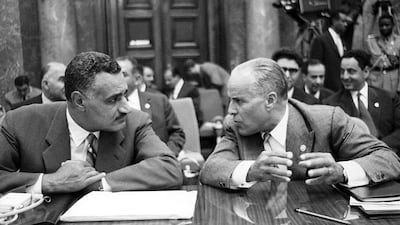In 1946, Egypt's youthful ruler King Farouk declared in an emergency meeting of regional leaders – effectively the predecessor to the Arab League – that the Jewish insurgency in Palestine was a pan-Arab issue.
More than 70 years later, six of the countries that attended the inaugural meeting in Cairo were joined by 15 other Arab states to discuss the same concern at the 29th Arab League Summit on Sunday.
There, Saudi Arabia’s King Salman announced a $200 million commitment to the Palestinians: $150 million for the maintenance of the religious administration that oversees the Al-Aqsa Mosque compound, and $50 million for the programs of the UN relief agency for Palestinian refugees.
Salman’s $200m donation to the Palestinians on Sunday is a step in the right direction, but it is unlikely to be enough to combat Israel’s growing footprint in Palestine. Since that first meeting, the Israeli presence in Palestine has developed from an insurgency to full-on occupation in the West Bank and East Jerusalem.
Part of the Arab League’s reaction has always been reluctant tolerance of Israel’s violation of United Nations sanctions.
For decades, Israel has had little regard for agreements or accords that the international community has passed in a bid to hold it to account.
If it continues to ignore hundreds of UN resolutions condemning its policies, it is unlikely to concern itself with statements from an international summit comprised mostly of countries that do not even recognize its existence.
Nonetheless, the Arab League has served as a continuous reminder of the Palestinian cause on the international stage.
_______________
Read more:
King Salman pushes for united stance against Iran at Arab summit
Arab League: US aid cut for UN Palestinian agency puts region at risk
Remembering Nasser, the godfather of Pan Arabism
_______________
The first official Arab League summit was held, again in Egypt, in 1964, convened by Gamal Abdel Nasser, then Egyptian president and godfather of Pan-Arabism. At that meeting, the Arab League formally approved the establishment of the Palestinian Liberation Organisation (PLO), a cause dear to the former Egyptian general’s vision of a unified Arab state.
Three years later, it convened again after an embarrassing defeat to Israel in the Six Day War, establishing the policy that famously stated: “no peace with Israel, no recognition of Israel and no negotiations with Israel”.
Since that meeting, the situation in Israel and Palestine has challenged the status quo of what became to be known as the “Three No’s”.
Of the 22 nations in the Arab League, three recognize Israel. Reports of numerous negotiations between Arab countries and Israel have been historically documented as well.
The policy of the “Three No’s” would change fundamentally in 2002. The league adopted the Arab Peace Initiative, a Saudi-led proposal resolution to the Arab-Israeli conflict that sought to normalize relations between the two sides of the conflict.
This was a far cry from the initial Arab League charter of 1951 that committed all members to treat acts of aggression on any member state as an act against all.
As Israel has become more entrenched in the region, so too have Palestinian expectations of their Arab partners in regard to the conflict.
The onus of addressing Palestinian concerns, today more so than ever, has been pulled to the forefront of Arab political concern. According to the leaders present at the meeting in the eastern Saudi city of Dhahran, the Arab League could be used as a platform to finally resolve the issue.
Whether a two-state solution, or a boycott of Israel, the 22-nation bloc finds itself in an awkward position where they need to take action.
A fund to help the daily lives of Palestinians is a start. But more importantly, as the Israeli-Palestinian issue unravels into a deeper political and diplomatic standoff, the weight of the Arab countries must be thrown behind its Arab neighbor.
Today, almost every leader of the 21 present at the summit condemned Washington’s decision to move the embassy to Jerusalem. Whether that declaration has any impact on the move remains unlikely.

